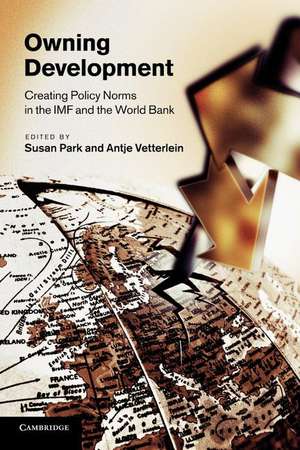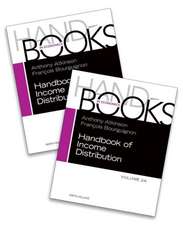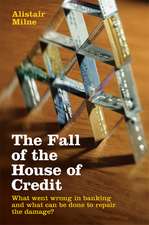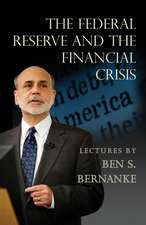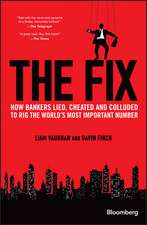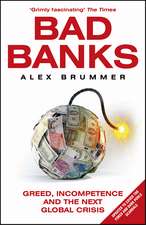Owning Development: Creating Policy Norms in the IMF and the World Bank
Editat de Susan Park, Antje Vetterleinen Limba Engleză Paperback – 29 aug 2012
| Toate formatele și edițiile | Preț | Express |
|---|---|---|
| Paperback (1) | 287.66 lei 6-8 săpt. | |
| Cambridge University Press – 29 aug 2012 | 287.66 lei 6-8 săpt. | |
| Hardback (1) | 722.84 lei 6-8 săpt. | |
| Cambridge University Press – 6 oct 2010 | 722.84 lei 6-8 săpt. |
Preț: 287.66 lei
Nou
Puncte Express: 431
Preț estimativ în valută:
55.05€ • 57.40$ • 45.75£
55.05€ • 57.40$ • 45.75£
Carte tipărită la comandă
Livrare economică 20 martie-03 aprilie
Preluare comenzi: 021 569.72.76
Specificații
ISBN-13: 9781107407046
ISBN-10: 1107407044
Pagini: 306
Ilustrații: black & white illustrations
Dimensiuni: 152 x 229 x 17 mm
Greutate: 0.45 kg
Editura: Cambridge University Press
Colecția Cambridge University Press
Locul publicării:New York, United States
ISBN-10: 1107407044
Pagini: 306
Ilustrații: black & white illustrations
Dimensiuni: 152 x 229 x 17 mm
Greutate: 0.45 kg
Editura: Cambridge University Press
Colecția Cambridge University Press
Locul publicării:New York, United States
Cuprins
Part I. Introduction: 1. Owning development: creating policy norms in the IMF and the World Bank Susan Park and Antje Vetterlein; Part II. Norm Emergence: 2. Internal or external norm champions: the IMF and multilateral debt relief Bessma Momani; 3. From three to five: the World Bank's pension reform policy norm Veronika Wodsak and Martin Koch; 4. The strategic social construction of the World Bank's gender and development policy norm Catherine Weaver; Part III. Norm Stabilization: 5. Lacking ownership: the IMF and its engagement with social development as a policy norm Antje Vetterlein; 6. Stabilizing global monetary norms: the IMF and current account convertibility André Broome; 7. Bitter pills to swallow: legitimacy gaps and social recognition of the IMF tax policy norm in East Asia Leonard Seabrooke; Part IV. Norm Subsiding: 8. The IMF and capital account liberalization: a case of failed norm institutionalization Ralf J. Leiteritz and Manuela Moschella; 9. The World Bank's global safeguard policy norm? Susan Park; 10. The new public management policy norm on the ground: a comparative analysis of the World Bank's experience in Chile and Argentina Martin Lardone; Part V. Conclusion: 11. Do policy norms reconstitute global development? Susan Park and Antje Vetterlein.
Recenzii
Review of the hardback: 'A carefully crafted and researched anthology that will be a 'must read' for anyone interested in international institutions and their policies in the post-Washington consensus period. It should also be read with profit by those interested in the role of ideas in policy making, as it goes well beyond the dominant 'diffusion' or 'internalization' approaches, and thus opens up a new research agenda.' Friedrich Kratochwil, European University Institute
Review of the hardback: 'This very strong volume makes a clear and distinct theoretical contribution in exploring how the World Bank and International Monetary Fund adopt and spread norms. The individual chapters are based on an impressive amount of interview and archive material, written by authors with deep expertise in the field. The book marks a major contribution to the study of international organizations and international relations theory more generally.' Jason Sharman, Griffith University
Review of the hardback: 'In this book Park and Vetterlein have assembled the next generation of academic leaders in international relations and political economy. They take the study of international organisation to a higher plane of insight by analysing the internally generated ideas and norms of the IMF and World Bank that drive global policy.' Diane Stone, University of Warwick, Central European University and University of Western Australia
Review of the hardback: 'This very strong volume makes a clear and distinct theoretical contribution in exploring how the World Bank and International Monetary Fund adopt and spread norms. The individual chapters are based on an impressive amount of interview and archive material, written by authors with deep expertise in the field. The book marks a major contribution to the study of international organizations and international relations theory more generally.' Jason Sharman, Griffith University
Review of the hardback: 'In this book Park and Vetterlein have assembled the next generation of academic leaders in international relations and political economy. They take the study of international organisation to a higher plane of insight by analysing the internally generated ideas and norms of the IMF and World Bank that drive global policy.' Diane Stone, University of Warwick, Central European University and University of Western Australia
Descriere
This book examines the sources of change within the International Monetary Fund and the World Bank.
